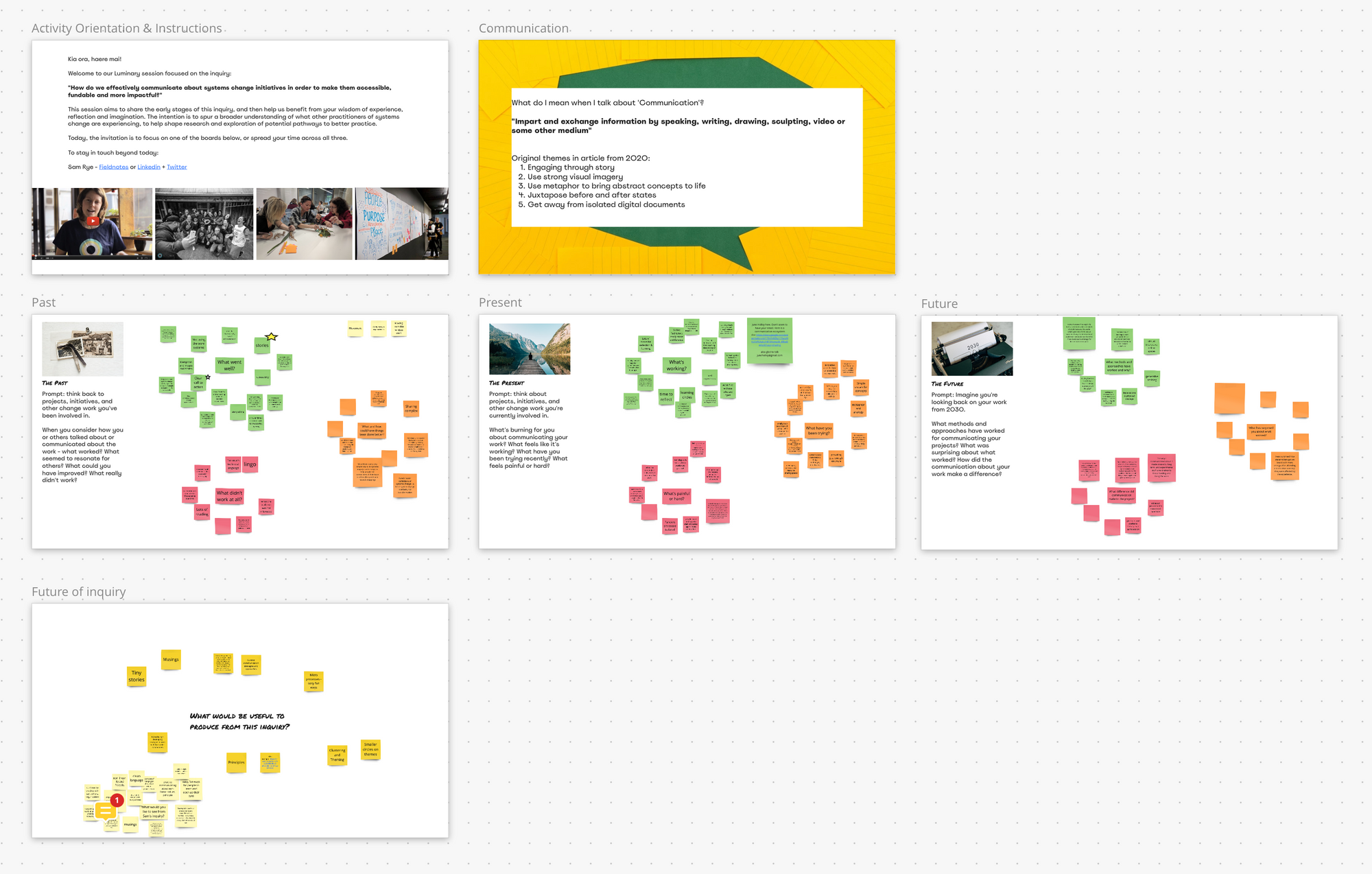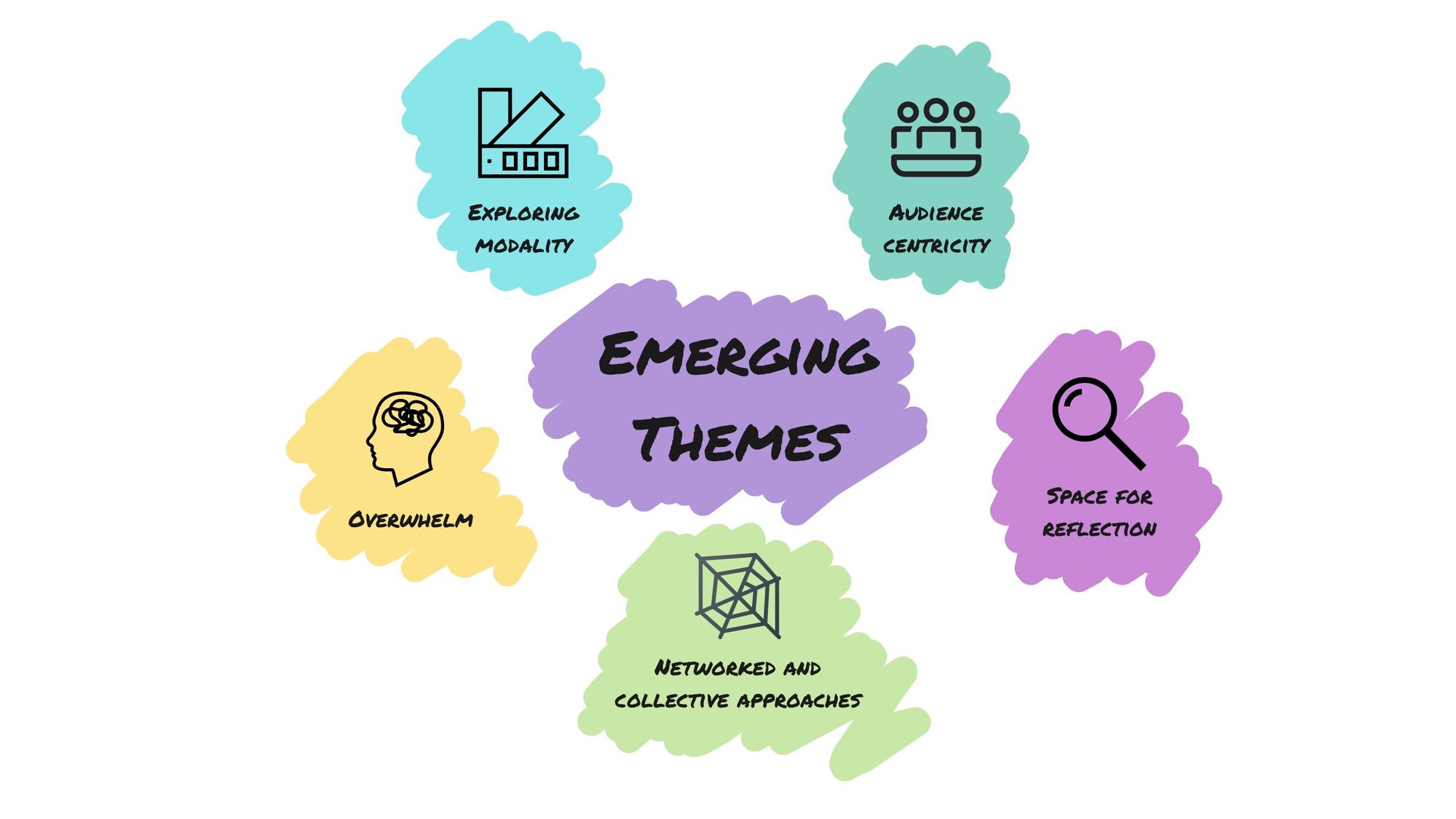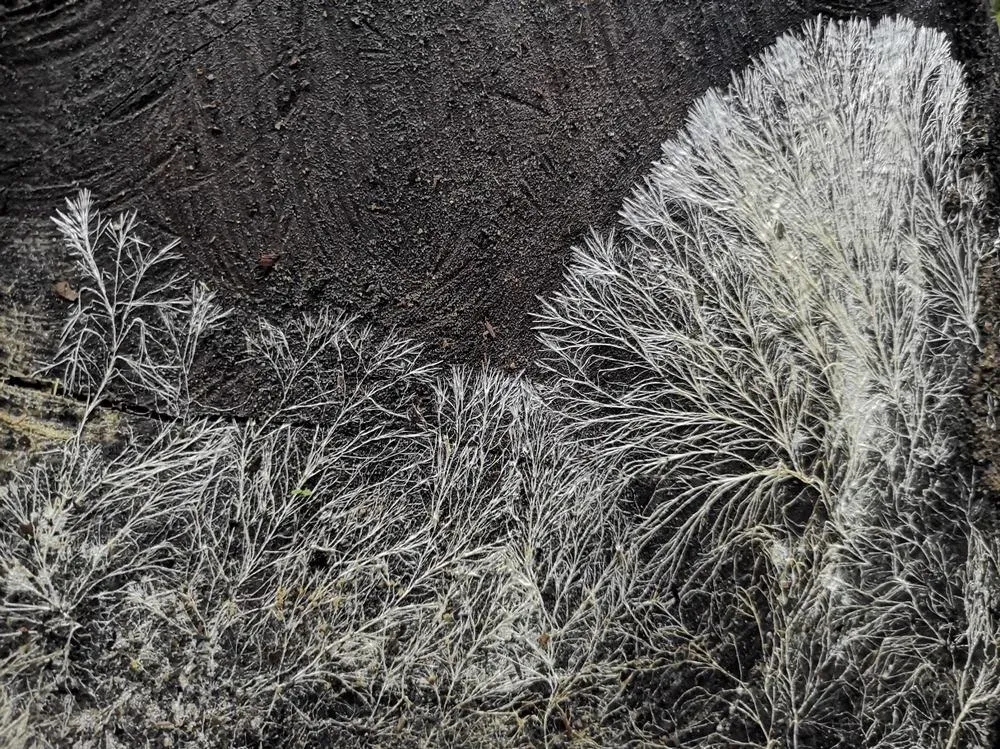Exploring how systems change practitioners use communications in their work
This post is a summary of a workshop with systems change practitioners exploring how they relate to communications as a function of their work.

Research is both a necessity and a luxury. The opportunity to learn from and support other practitioners was a drawcard when I joined the Luminary program with an inquiry about communicating systems change.
You can read about my journey with the Luminary program here.
So in April, I was delighted to be able to work with a small group of practitioners from around the world, and create space for them to think and share their thoughts about my inquiry.
I decided to explore the essence of the inquiry through different perspectives in time - looking back into their past, pausing to reflect in the present, as well as standing in the future and considering the challenges and opportunities.
Whist I had a few different ideas about how to facilitate the session, life got in the way whilst I was making plans, and I had to fall back to the tried-tested-and-a-little-weary Miro session, which resulted in some useful perspectives:

The goal of the session for me was to generate some threads which other practitioners felt were worthy of note - things that were positive, difficult or worth exploring, when it comes to communicating systems change projects.
Emerging Themes
I've pulled apart the ideas and thoughts raised in the workshop by other practitioners (thank you to all of you who joined) and entered them all into a research repo in Dovetail.
I spent a bit of time tagging, affinity mapping, and generally working with what people shared from a few angles. These are some of the things that stood out for me.

Exploring modality
The workshop invited reflection on what was working / what wasn't / what people wanted to try and thought would make a differrence when communicating systems change. There was significant reflection on the different modes that could be used to communicate - such as 1-to-1 storytelling, written articles, visual scribing, video and more.
Things that seemed to be working included:
- storytelling approaches which weave metaphor, visuals and other media together, to present both the rich layers of the work, show change over time, as well as weave a narrative about why the work is important
- visual approaches which utilise sketchnoting, photography, data visualisation, videography and sometimes metaphor
- making things bite-sized to help introduce concepts and information in 'digestable amounts'
Audience centricity
There was a significant amount of points about the need to tailor information and messaging to specific audiences.
This isn't a surprise - it's a foundational part of communications practice, but perhaps reflects the recognition of pracitioners who are having to pick up / contribute to communications work in their projects without training, or just a reinforcement that because systems change work can rapidly veer into technical / jargon / high need for common context to be understood - developing separate communications for different stakeholder is very important.
This speaks to the need for communications to be properly invested in by systems change initiatives (and the need for this recognised in funding proposals and by funders), as communications plays an important role in:
- bringing stakeholders along on the journey
- gaining additional and ongoing funding
- producing coherent and cogent information about what the initiative is achieving and making it accessible to the various stakeholders
Space for reflection
Another major theme both of what was working, what was needed, and what would shift the dial - was time, space and resources for reflection. As per all lines of work, when you're "in the work" it can be very difficult to get your head and mindset to a place where you can not only understand your work from arm's length, but also to find the words and concepts to convey it to other people.
That said, there were a lot of positives associated with this sentiment, for example that:
- gathering in learning circles or through coaching programs was helping people to "work on" their initiative as well as "work in" it
- building time and space for reflection structurally into their initiative in order to proactively create the space and time to do communications work properly
- experimenting with a range of modes of reflection - short weekly pop-ups, verbal dictation, fieldnotes, turning ideas into practice resources (like card decks or canvases), and longer term enquiries with peers
- using frameworks and metaphors to 'stay located' within a landscape of activity over time, and use previous reflections as 'waypoints' to refer back to
Overwhelm
In the past I've often heard overhwelm used by practitioners to refer to their own state, but this time was different. The topics of confusion and overwhelm came up several times when it came to what was not working so well.
People shared the likes of:
- language being inappropriate for the audience - too much jargon, technical language, or information presented which isn't relevant
- background information or context being introduced to try to help people understand how the initiative was 'different' which created too much / confusing information which blocked people from getting the real message (this is especially common with 'complexity practice' where concepts of emergence, change and the likes are injected and force readers to reckon with their own worldviews, before they can get to the other information)
- sharing too much - people are already overwhelmed, and probably don't need another 50 page report to read. This was mentioned a lot parallel to exploration of different modes, such as illustration and infographics
- specifically needing to develop entry-level resources and information for people new to the initiative, as well as
Networked and collective approaches
There was also a rich vein of dicussion about initaitives breaking out of the siloed approaches of the past, where they mainly focused on communicating their own initiative first and foremost.
Instead, there was lots of talk of the rich tapestry of relationships, network building, and learning ecosystems & ecotones of practitioners who were collectivising their efforts and building power over time.
This included things like:
- peer-to-peer learning circles amongst practitioners to learn from one another about what was working, but also to share progress and 'get the word out' in a more word-of-mouth way
- email newsletters and social media which curate from a wide range of individuals, projects and initiatives
- building 'impact networks' across broad geographies / topics which could be leveraged to share news and opportunities through a wider network

What's next?
These emerging themes have been a helpful grounding to sense check how a small group of fairly experienced people from across the world are reflecting on and seeing their own practice, and what's on top for them.
I'm interested to dig into similar questions with other practitioners who are earlier in their journies too, and see if there's common experiences and needs, or whether they diverge somewhat. Likewise I feel the need to connect with Communications practitioners who are working within systems change projects, to learn more about their experiences.
From there, I'm still exploring a couple of different options:
- Go deep - work with a systems change project to develop a communications approach and collateral, and then spend some time pulling it apart to explain the rationale for different decisions we made.
- Go wide - develop some microskills, processes and the likes which could be used for different scenarios that systems change practitioners might encounter.
- Sector engagement - this challenge shouldn't solely be practitioners' responsibility to solve - it will need funders, initiative leads, communication professionals and more. This might involved pulling together some working groups from different disciplines to help influence how communication is related to in the sector.
What have I missed?
I'm always aware that I have my own angles and lines of sight - so I'd love to hear if this has sparked something for you, and if so - what that might be.
Have you seen some amazing examples of communication of systems change initiatives? Are you aware of work happening in this space? Is there people I simple have to talk to?
Contact me on Linkedin or Twitter, as ever - or my web chat.
[Bonus : for reading this far, here's a beautiful track about mycelium which is fast becoming the theme tune for this inquiry...]





